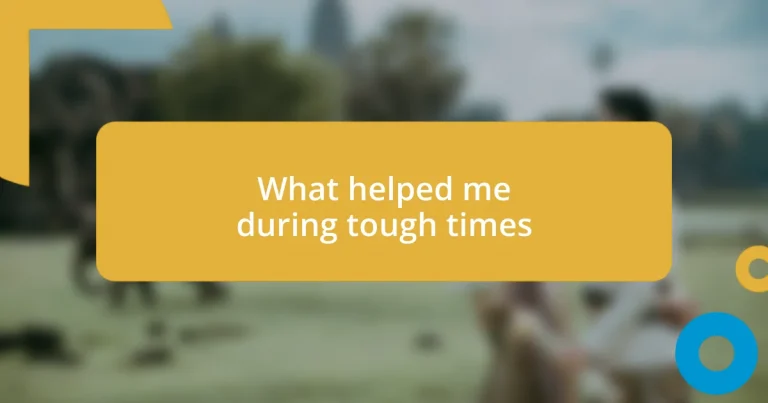Key takeaways:
- Experiences of adversity, such as job loss and financial struggles, can ignite personal growth and resilience.
- Building a strong support system through friendships and professional help is crucial for navigating tough times.
- Practicing mindfulness, gratitude, and maintaining a self-care routine can significantly enhance mental resilience and motivation.
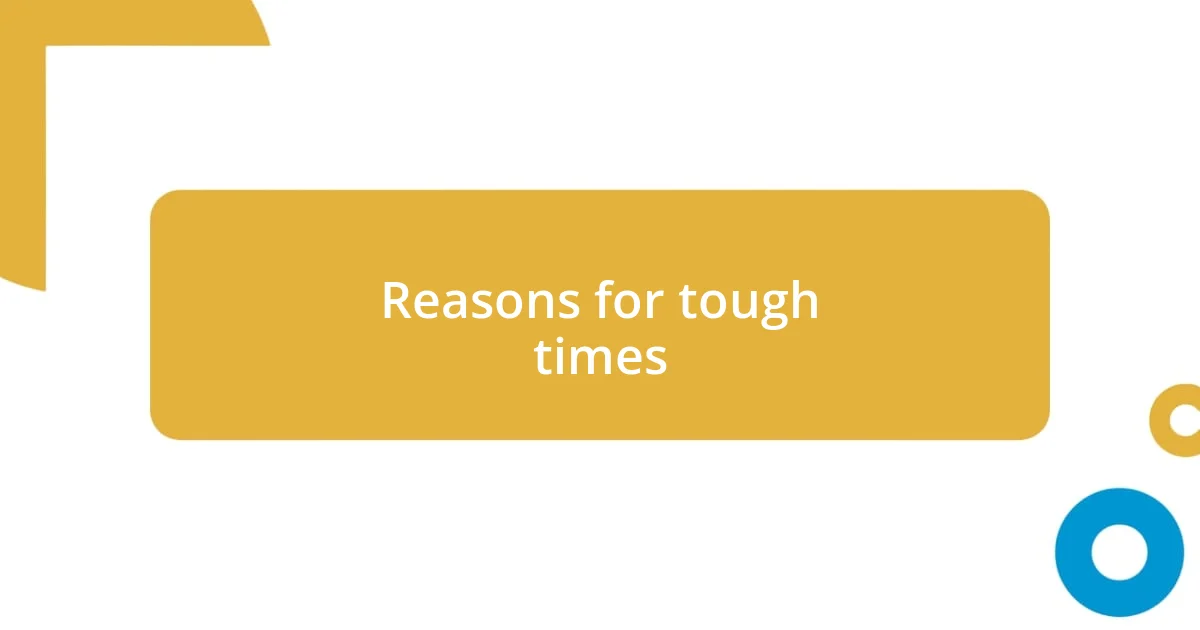
Reasons for tough times
Tough times often stem from unexpected life events, like losing a loved one or facing sudden job loss. I remember the shock I felt when I was laid off; that moment felt surreal, like the ground had literally disappeared under my feet. How do we prepare for something that shakes our very foundation?
Financial strain is another common reason for hardship. I’ve experienced the stress of mounting bills and dwindling savings, leaving me questioning how I would make ends meet. It’s a heavy emotional burden, isn’t it? The weight of uncertainty can loom over us like a dark cloud, making it hard to see a way forward.
Additionally, personal relationships can bring incredible stress during tough times. When a close friendship ended unexpectedly, I felt a deep sense of betrayal and loss. Have you ever felt isolated in your struggles, as if no one truly understands? That isolation can amplify our challenges, making them seem even more daunting.
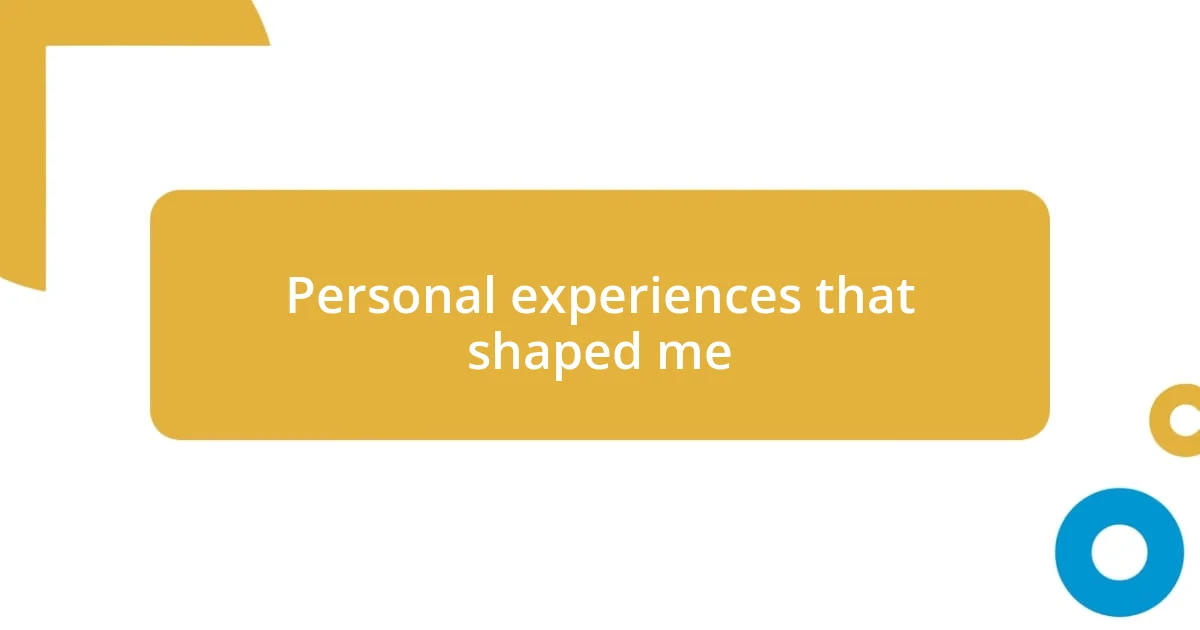
Personal experiences that shaped me
There were moments in my life when experiences transformed how I viewed adversity. I distinctly recall a time during college when I faced academic pressures that felt insurmountable. Balancing multiple jobs while trying to keep my grades up was overwhelming. In the midst of sleepless nights and countless cups of coffee, I learned the importance of resilience and time management. The thrill of finally graduating, despite those hurdles, taught me that perseverance truly pays off.
Reflecting on the moments that have shaped me, several key experiences come to mind:
- The layoff: That shocking day propelled me to reevaluate my career goals and ignite a passion for entrepreneurship.
- Financial struggle: It motivated me to develop a budgeting habit that not only alleviated my stress but also built my financial literacy.
- The end of a close friendship: It forced me to deepen my understanding of trust and the value of surrounding myself with supportive people.
These experiences, while challenging, have been pivotal in my growth and understanding of resilience.
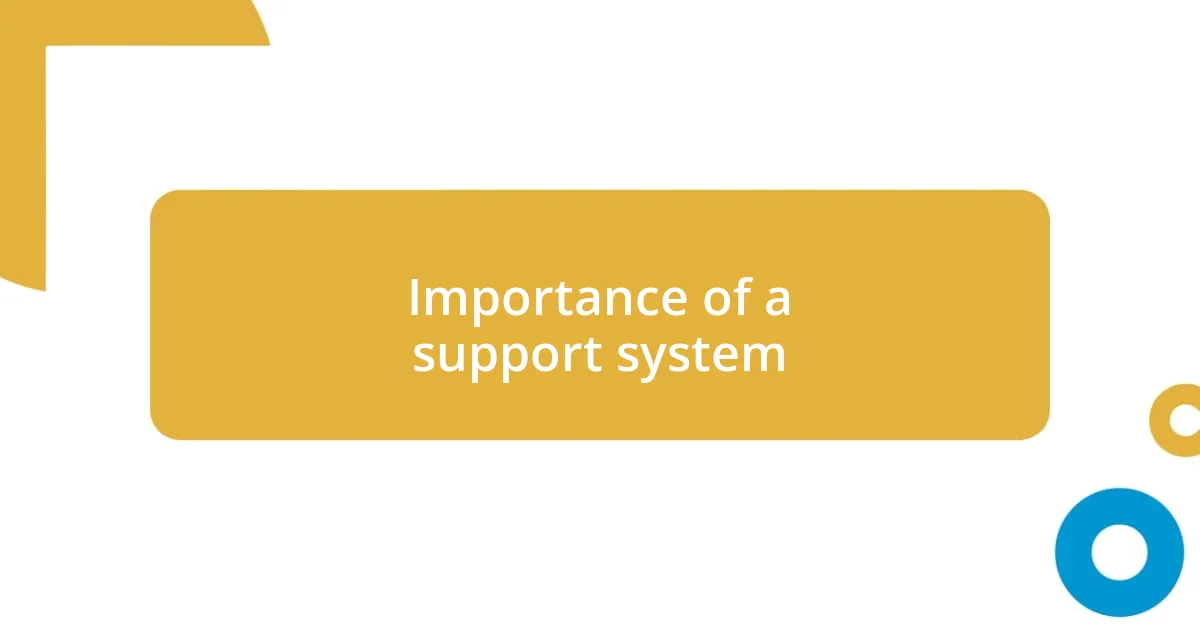
Importance of a support system
Building a robust support system can make an incredible difference during tough times. I recall a particularly challenging period when I was grappling with my mental health. Having close friends who checked in and listened without judgment was invaluable. Their presence reminded me that I wasn’t alone in my struggles, helping me feel seen and supported in a way that transformed my outlook.
Moreover, it’s fascinating how different types of support can emerge from various relationships. While professional guidance from a therapist can provide tools for coping, friends and family often offer emotional comfort and understanding. Just think about it: when I faced setbacks in my career, my colleagues’ encouragement provided a boost that complemented my therapists’ strategies, leading to a more holistic recovery. Sometimes, the mere act of sharing your burden with others can lighten the load significantly.
Lastly, I believe that actively nurturing a support system is essential. I’ve seen firsthand how relationships can fade when they aren’t tended to. It’s like a garden; without attention, the weeds can take over. By investing time in friendships, I’ve found that those connections strengthen, providing an even more powerful network during tough times. These relationships have become lifelines that help me navigate life’s unpredictability with resilience and hope.
| Type of Support | Examples |
|---|---|
| Emotional Support | Friends listening to your problems |
| Professional Support | A therapist providing coping strategies |
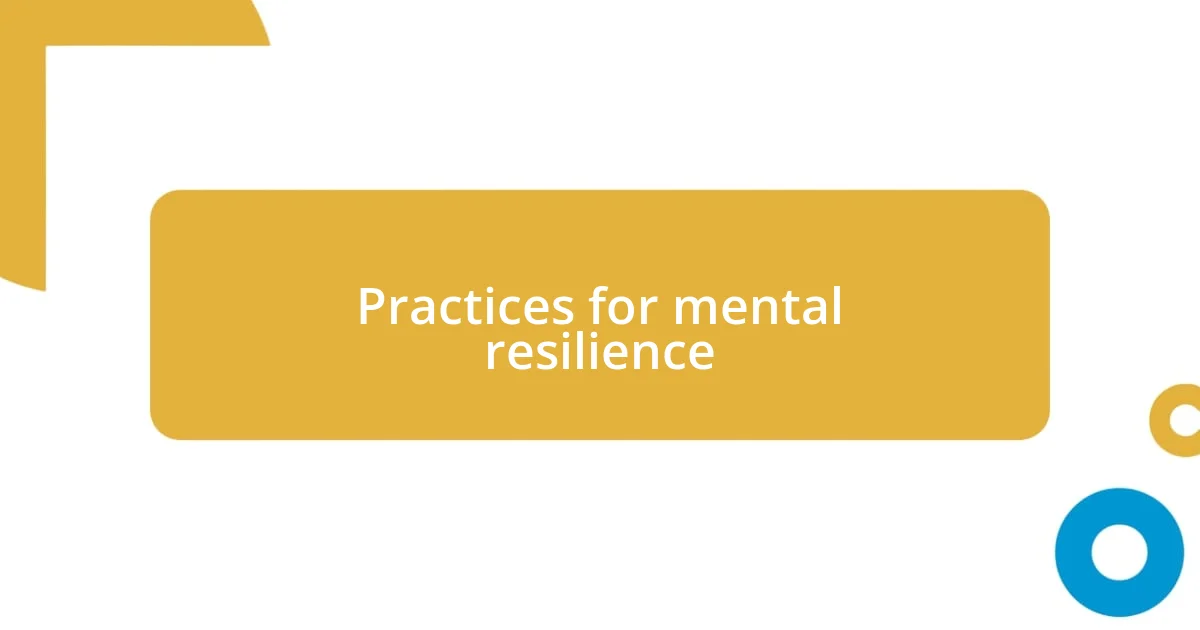
Practices for mental resilience
Practices for mental resilience can take many forms, but what I’ve found most effective is the art of mindfulness. During a particularly stressful phase in my life, I stumbled upon meditation through a friend. I’ll admit, at first, it felt a bit strange to just sit in silence. However, the more I practiced, the clearer my mind became. It’s incredible how just a few minutes of focused breathing can bring me back to the present moment and reduce anxiety. Have you ever noticed how everything feels more manageable when you step back and breathe?
Another practice that has truly bolstered my resilience is maintaining a gratitude journal. I started this habit during a difficult semester, when every day felt like climbing uphill. By jotting down even the tiniest joys—like the taste of my morning coffee or the support of a friend—I discovered a shift in perspective. I was training my mind to recognize the positives, no matter how small. Reflecting on this process, I’ve realized that focusing on gratitude can be a profound antidote to negativity, helping to reinforce a mindset of resilience.
Lastly, finding a physical outlet has been crucial for me. When I was overwhelmed by life’s burdens, I took up running. Initially, it felt like a chore, but as I pushed through, I began to appreciate the endorphins and the clarity it brought to my thoughts. It’s like unleashing my worries with each step. Have you ever experienced that exhilarating rush after a workout? It’s not just about physical health; it feeds into my mental resilience by equipping me with the energy and positivity to face challenges head-on.
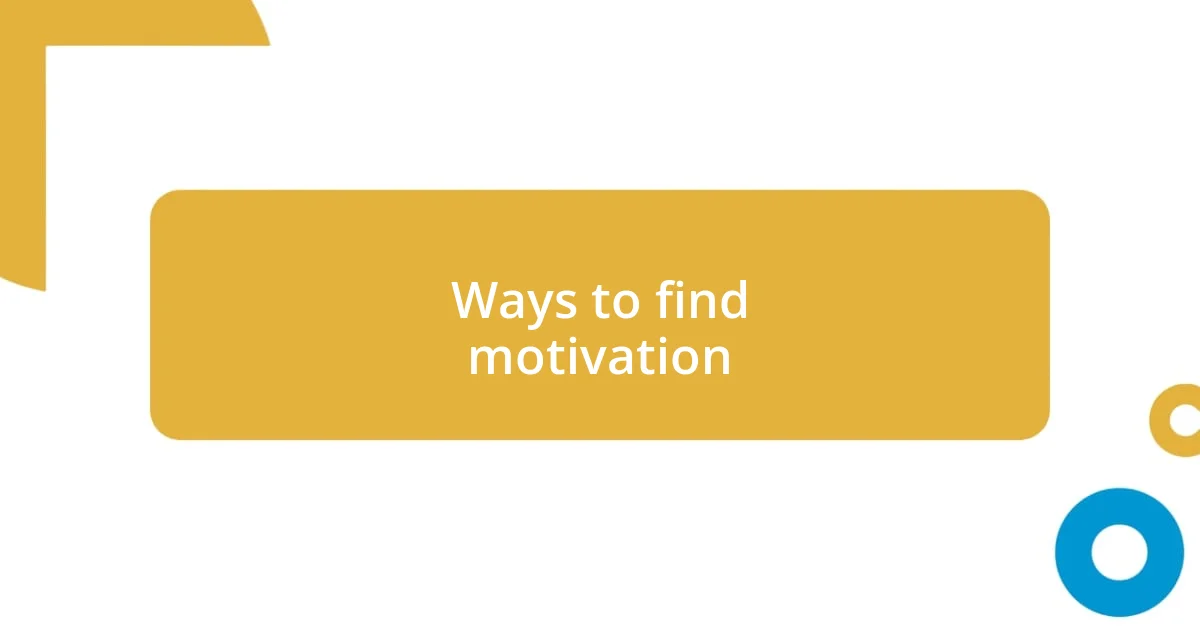
Ways to find motivation
Sometimes, motivation can feel elusive, especially when challenges are looming. One thing that always works for me is to set small, achievable goals. I remember a tough time when my to-do list felt insurmountable. Instead of panicking, I broke it down into tiny steps, like “just write one paragraph” or “make one phone call.” This approach transformed an overwhelming task into manageable bites, reigniting my drive. I often find that celebrating these little wins can create a ripple effect of motivation in other areas of my life. Don’t you think it’s rewarding to recognize progress, no matter how small?
Another powerful tool in my motivational toolbox is inspiration from others. I love listening to podcasts or watching talks from people who have overcome obstacles. Their stories resonate with me and remind me that resilience is a universal experience. I recall a podcast episode where the host shared her journey through failure and how it ultimately fueled her success. It struck a chord with me; it’s easy to feel isolated in tough times, but hearing someone else’s journey reminds me I’m not alone in the struggles. What stories inspire you to push forward?
Finally, embracing creativity has played a huge role in helping me find motivation. I took up painting during a particularly stagnant phase and discovered that it was more than just a hobby; it became a form of self-expression. Each brush stroke felt like a release, allowing me to channel my feelings into something tangible. I’ve learned that creativity doesn’t have to be about perfection; rather, it’s about exploration and connection within myself. When was the last time you engaged in something creative? I find that these moments can spark a renewed sense of purpose and motivation.
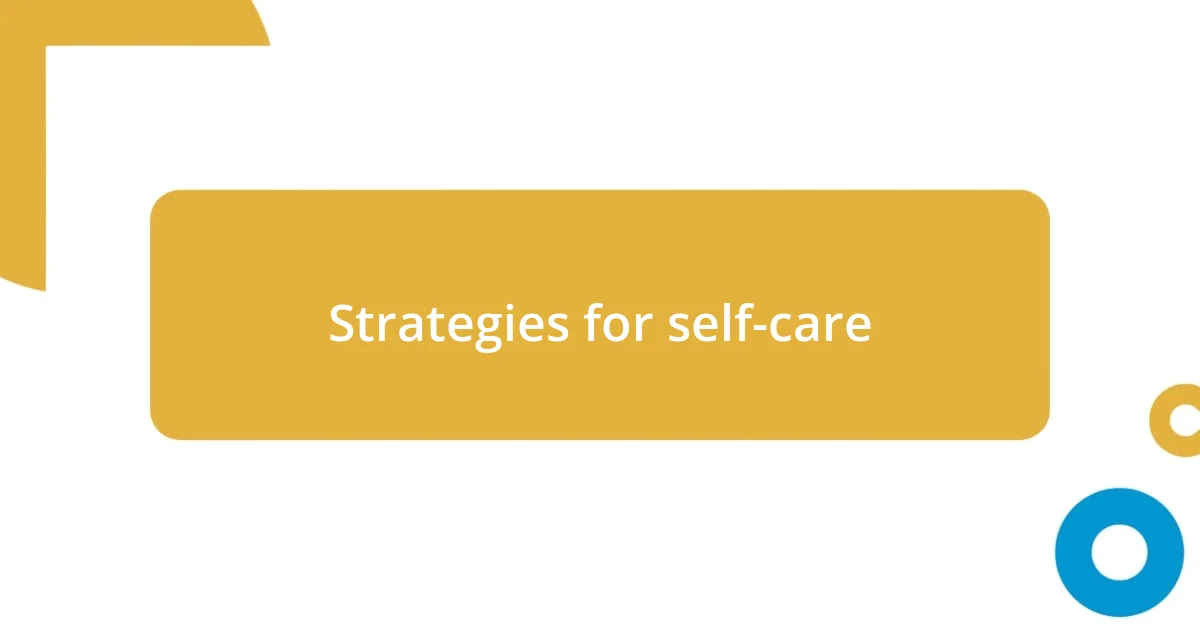
Strategies for self-care
When it comes to self-care, I’ve found that carving out time for myself can be transformative. One day, feeling particularly drained, I decided to dedicate an entire afternoon to just doing things that bring me joy—like reading a book or taking a long, leisurely walk. I realized that these moments of self-indulgence don’t just fill my cup; they also provide the fuel I need to tackle daily stressors. Have you ever set aside time just for yourself?
Another strategy that has made a significant difference for me is connecting with nature. I remember a weekend trip where I spent hours hiking in the mountains. The fresh air and beautiful scenery lifted my spirits in ways I couldn’t have anticipated. There’s something grounding about being outdoors, right? It’s a reminder that I’m part of something bigger. For me, those quiet moments in nature serve as a reset button, recharging my mindset and allowing me to return to my challenges with renewed energy.
Maintaining a consistent sleep routine also enhances my self-care tremendously. During a particularly busy period, I let my sleep schedule slip, and I quickly felt the repercussions. I made a conscious effort to go to bed and wake up at the same time each day, creating a sense of stability. The difference was astounding! I felt more alert and emotionally balanced. Have you experienced the lack of sleep affecting your mood? Prioritizing good sleep has become one of my essential self-care strategies, and I can’t stress its impact enough.
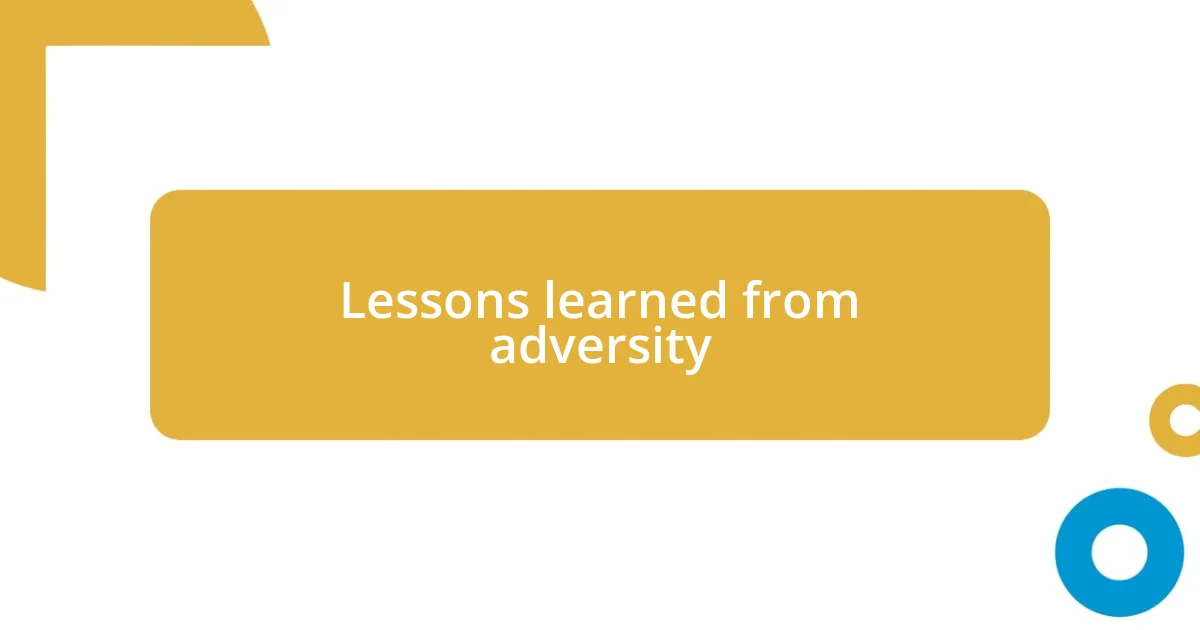
Lessons learned from adversity
Adversity has a unique way of shaping our perspectives, doesn’t it? I’ve often found that the hardest times are the ones that teach me the most about resilience. For instance, after a significant setback in my career, I gleaned the importance of flexibility. I learned that my original plans weren’t set in stone and that adapting to change can lead to unexpected opportunities. How has flexibility influenced your journey during tough times?
One striking lesson that stands out is the power of vulnerability. Opening up about my struggles not only strengthened my relationships but also allowed me to connect with others on a deeper level. I remember confiding in a friend during a particularly low phase. Instead of feeling embarrassed, I was met with understanding and shared experiences, which made the burden feel lighter. It’s interesting how vulnerability can transform isolation into solidarity. Do you find it easy or difficult to share your struggles with others?
Lastly, I realized that gratitude can emerge from the darkest situations. After facing a personal challenge, I started a gratitude journal to shift my focus from what was wrong to what was still good in my life. I remember writing down even the simplest things, like a warm cup of coffee or a kind word from a stranger. This practice not only lifted my spirits, but it also fostered a sense of hope and positivity amidst chaos. Isn’t it fascinating how gratitude has the power to change our outlook even in overwhelming times?












